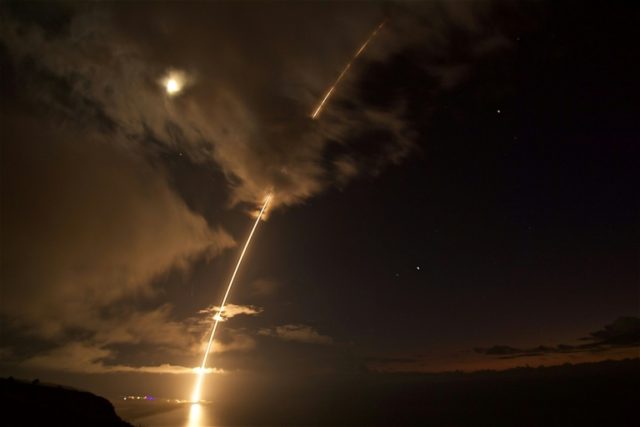The Japanese Defense Ministry released a budget proposal on Friday that would increase spending by 2.1 percent to $48 billion, the seventh annual increase in a row and the biggest military budget in modern Japanese history.
The largest increase in the budget covers missile defense, including the purchase of $2.1 billion in American-made missile interceptors.
Reuters reported Friday on some details of the budget, including money for Lockheed-Martin’s Aegis Ashore missile tracking radar, long-range Raytheon Co. SM-3 interceptor missiles designed to strike enemy ICBMs in space, and improved PAC-3 missile batteries to improve Japan’s last line of defense.
The Defense Ministry clearly stated in a white paper published on Thursday that North Korea and its missiles remain the nation’s “most serious and pressing threat.”
Reuters also anticipated the anti-missile system purchases will please U.S. President Donald Trump, who has strongly encouraged Tokyo to buy such equipment. Trump is scheduled to meet with Prime Minister Shinzo Abe at the United Nations in New York in September.
On one hand, Japan’s steadily increasing military budget might be taken as a tacit vote of no confidence in America’s diplomacy toward North Korea; few members of Abe’s administration seem to believe Pyongyang will be denuclearizing soon.
On the other hand, the Japanese defense budget underlines the importance of signaling North Korea that it cannot threaten Japan to obtain leverage against the international coalition lined up against its nuclear weapons program.
North Korea is not the only prospective opponent Japan is worried about. Japan currently boasts the world’s fourth most powerful military, while the United States is Number One. Numbers Two and Three are China and Russia, both of which have ambitions troubling to Tokyo. A good deal of the Defense Ministry’s spending increase is for improved warplanes to counter the growing threat of China’s air force.
Prime Minister Abe has long believed Japan should amend its pacifist constitution and develop greater capabilities to project power over disputed waters and act preemptively. The Japanese also share U.S. and NATO concerns about space and cyber warfare.
“The security environment surrounding Japan has turned more severe and uncertain at a much faster pace than we anticipated five years ago when we set the current guidelines,” Abe told a government panel on Wednesday.
The Defense Ministry’s spending proposal was not met with universal applause. Military spending increases remain controversial with some of the Japanese public on pacifist principle. Abe has been criticized for spending too much on American equipment and not enough on developing Japan’s indigenous defense industry. Citizens who live near the proposed sites for the enormously powerful Aegis Ashore radar system worry that it could have negative effects on the environment and make them targets for enemy first strikes.
Writing at Military Times this week, retired U.S. Admiral Dennis Blair, formerly head of the U.S. Pacific Command, advised Japan (and Taiwan) to cut costs by refraining from scrambling ships and planes to respond to every Chinese provocation.
Blair noted the people of both islands expect a response every time Chinese forces operate near their airspace, but in truth, proper deployment of state-of-the-art sensory equipment should make it possible to ignore the Chinese unless they actually violate protected airspace instead of merely threatening to do so.
He proposed China’s provocative flights are actually a way for Beijing to bleed off Japanese and Taiwanese military resources while it trains its own pilots, and mischievously suggested Japan and Taiwan should conduct training missions on the edge of Chinese airspace to likewise push them into wasting time and fuel on intercept missions.

COMMENTS
Please let us know if you're having issues with commenting.